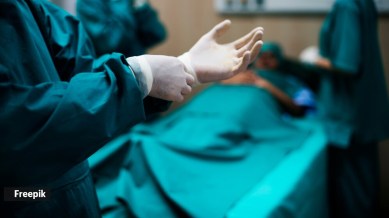📣 For more lifestyle news, click here to join our WhatsApp Channel and also follow us on Instagram
Why patients are strictly advised to not eat anything before surgery
If there's ever confusion about what or when to eat and drink before surgery, timely communication with the healthcare or surgical team is key

Have you ever wondered why patients are strictly advised not to eat anything before surgery? Not even a few nuts or a piece of a banana. We were curious, so we reached out to experts to get informed insights. This is what we found.
What is the guideline?
monthly limit of free stories.
with an Express account.
All patients are advised to refrain from eating for eight to 12 hours prior to surgery. While clear liquids may be allowed in certain cases, no solid food must be consumed for at least eight hours.
Why?
Fasting before surgery is far more than just a medical rule, said consultant dietitian Kanikka Malhotra. “It’s a scientifically grounded practice called NPO or Nothing By Mouth to safeguard every patient’s well-being and recovery,” Malhotra said, adding that it is one of the most important pre-surgery instructions.
“When you receive anaesthesia, your body’s natural reflexes are temporarily paused. If your stomach contains food or liquid, it could come back up and accidentally enter the lungs. This could lead to serious problems like choking or aspiration pneumonia. Keeping the stomach empty makes anaesthesia safer and surgery smoother,” explained Dr Amit Saraf, director of internal medicine, Jupiter Hospital, Thane.
Is this the case for all types of surgeries?
Whether it’s a small procedure or a major one, anaesthesia can interfere with normal swallowing and coughing reflexes. “That’s why doctors follow the ‘nil by mouth’ rule before almost every surgery. The only difference might be how long you need to fast, which can depend on the type of surgery and the patient’s health condition,” said Dr Saraf.
So, what happens when the guideline is followed?
By following fasting guidelines — typically refraining from solid foods for about eight hours and liquids for two hours before surgery — the body is given time to clear the stomach, ensuring the airways remain protected during the procedure. “This practice might feel like an inconvenience, especially for those already facing surgery-related anxiety, but it’s truly a critical element of surgical safety,” Malhotra asserted.
Fasting also keeps the stomach empty, which helps the anesthesiologist work safely and lowers the risk of nausea and vomiting after surgery, said Dr Swarup Swaraj Pal, Chief CVTS surgeon, Cardiovascular and Thoracic, MICS, Trauma, and Transplant surgeon at Gleneagles Hospital, Parel, Mumbai. Patients should be aware that strict adherence reduces risks, enhances the chances of a smooth surgery, and accelerates post-operative healing, added Malhotra.
“If there’s ever confusion about what or when to eat and drink before surgery, timely communication with the healthcare or surgical team is key. Taking this step seriously is a simple, scientific, and human act of self-care that can make a world of difference to every patient’s surgical journey,” said Malhotra.
What to remember?
— This practice is very important for both children and adults, as it ensures a safe surgery with fewer risks.
– Don’t assume a light snack or a cup of tea is harmless; it can still increase risks.
– Be open with your healthcare team if you’ve accidentally eaten or drunk something. Hiding it can be dangerous, Dr Saraf asserted.
– Follow any extra instructions about medicines, as some may need to be taken with a sip of water even during fasting.
DISCLAIMER: This article is based on information from the public domain and/or the experts we spoke to. Always consult your health practitioner before starting any routine.
📣 For more lifestyle news, click here to join our WhatsApp Channel and also follow us on Instagram